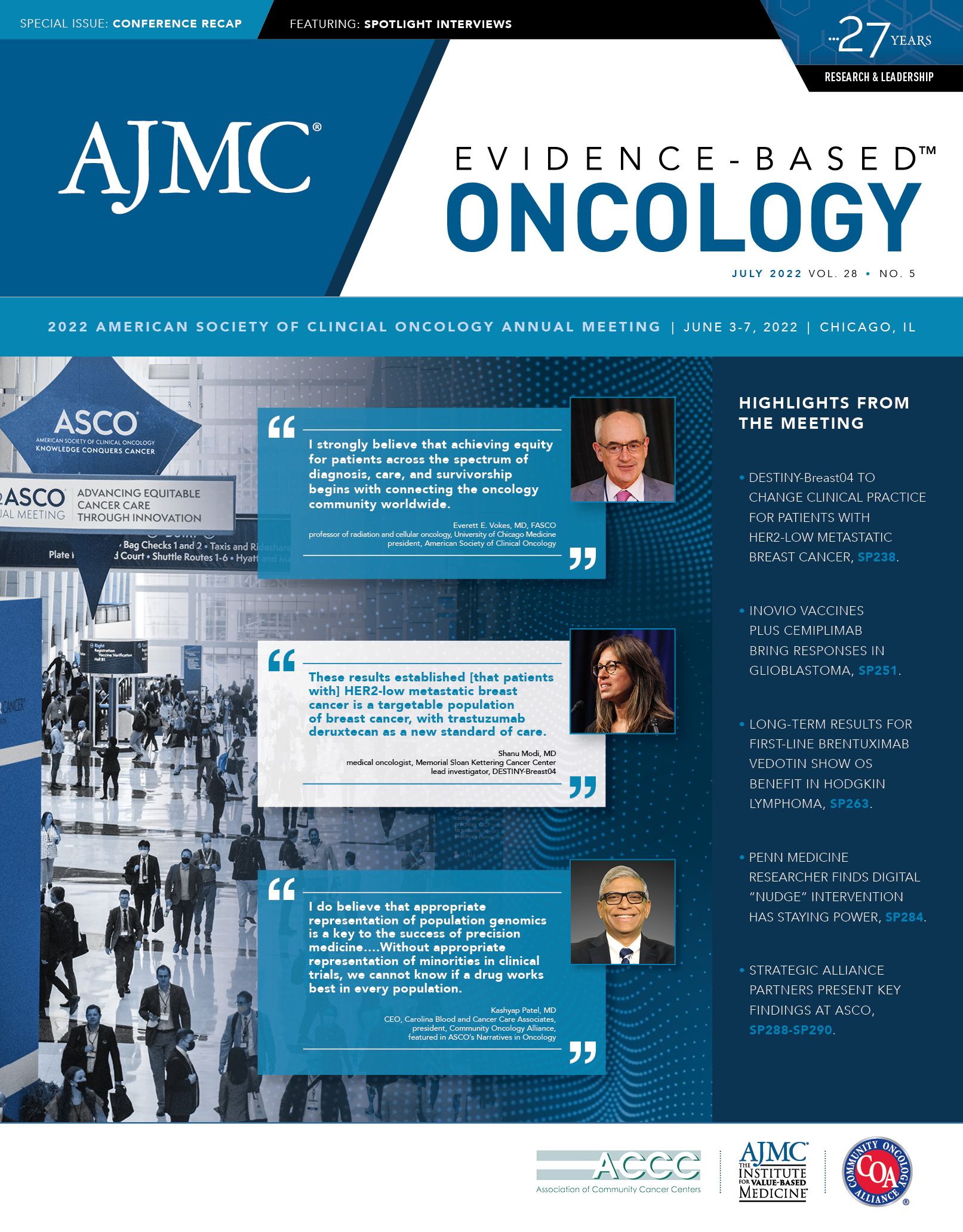- Center on Health Equity & Access
- Clinical
- Health Care Cost
- Health Care Delivery
- Insurance
- Policy
- Technology
- Value-Based Care
Data Indicate Lower Response Rates to Axi-cel Among Black Patients
Compared with White patients, Black patients who received axicabtagene ciloleucel (axi-cel) to treat large B-cell lymphoma had lower response rates to the chimeric antigen receptor (CAR) T-cell therapy. The review of real-world data was presented during the 2022 American Society of Clinical Oncology (ASCO) Annual Meeting.
Frederick L. Locke, MD, vice chair of the Department of Blood and Marrow Transplant and Cellular Immunotherapy and program coleader of immuno-oncology at Moffitt Cancer Center in Tampa, Florida, said the data from 1389 patients help fill in gaps in understanding how patients from different racial and ethnic groups respond to axi-cel (Yescarta). Data were gathered in a postapproval safety study among patients treated between October 2017 and August 2020, with a data cutoff of June 22, 2021. The median follow-up was 12.7 months. Outcomes were overall response rate (ORR), complete response (CR) rate, duration of response (DOR), progression free survival (PFS), and overall survival (OS) at 12 months; grade 3 or greater cytokine release syndrome (CRS); and immune effector cell-associated neurotoxicity syndrome (ICANS).
In this group, 1127 patients were White (81%), 70 were Black (5%), 81 were Asian (6%), and 152 (11%) were Hispanic, which included 104 White Hispanic, 2 Black Hispanic, and 1 Asian Hispanic patients. Black patients were younger than White patients, had a median age of 55.5 years vs 62.8 years, and were more likely to have pulmonary impairment (41% vs 28%). Hispanic patients were younger than non-Hispanic patients (58.5 vs 62.6 years).
Black patients also had a longer time between diagnosis and treatment; 71% had a wait time of at least 12 months compared with 59% of White patients.
Response rates were as follows:
- White patients: ORR 74%, with CR 57%, PFS 48%, and OS 63%
- Black patients: ORR 57%, with CR 45%, PFS 36%, and OS 62%
- Asian patients: ORR 67%, with CR 53%, PFS 55%, and OS 65%
- Hispanic patients: ORR 73%, with CR 55%, PFS 50%, and OS 65%
In addition, Hispanic patients had lower rates of grade 3 or higher CRS (4%) and ICANS (15%) than non-Hispanic patients (9% and 27%, respectively).
The ORR of Black patients was inferior to that of White patients (odds ratio [OR], 0.40; 95% CI, 0.24-0.69), as was the CR (OR, 0.55; 95% CI, 0.32-0.93). However, no statistical differences were found in PFS or OS across races. Locke elaborated further during the session.
“No differences in efficacy outcomes were observed among patients who were Hispanic or Latino and those who were not Hispanic or Latino,” he said. “Asian patients appeared to have a favorable duration of response compared with White and Black or African American patients. Lastly, a lower response rate observed among Black or African American patients compared [with] White patients warrants further investigation into additional factors that may account for this difference, such as high disease burden, different disease biology, and importantly, different access to care.”
Reference
Locke FL, Siddiqi T, Jacobson CA, et al. Real-world outcomes of axicabtagene ciloleucel (axi-cel) for the treatment of large B-cell lymphoma (LBCL) by race and ethnicity. J Clin Oncol. 2022;40(suppl 16):7571. doi:10.1200/JCO.2022.40.16_suppl.7571

Quality of Life: The Pending Outcome in Idiopathic Pulmonary Fibrosis
February 6th 2026Because evidence gaps in idiopathic pulmonary fibrosis research hinder demonstration of antifibrotic therapies’ impact on patient quality of life (QOL), integrating validated health-related QOL measures into trials is urgently needed.
Read More
Building Trust: Public Priorities for Health Care AI Labeling
January 27th 2026A Michigan-based deliberative study found strong public support for patient-informed artificial intelligence (AI) labeling in health care, emphasizing transparency, privacy, equity, and safety to build trust.
Read More
